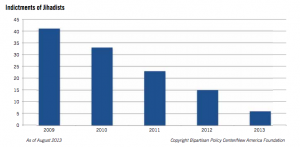FBI’s Curious Silence about the Waltham Murders
Susan Zalkind, who has relentlessly followed the story of Ibragim Todashev, the friend of Tamerlan Tsarnaev whom FBI killed back in May, has a long story in Boston Magazine. The whole thing is worthwhile (though beware the disturbing pictures of Todashev’s corpse). But I’m particularly fascinated by the way Zalkind chronicles when the FBI started asking people about Todashev’s possible involvement in the Waltham triple murder.
She notes that the only person the FBI questioned about Todashev’s potential role in the murders while he was still alive (aside, presumably, from Todashev himself) was his girlfriend, Tatiana Gruzdeva.
While he was being interviewed, Tatiana said, two agents took her into an office, where they questioned her for three hours. At first they continued to ask her about the Boston bombings. The agents wanted to know if Ibragim was planning another attack.
“They asked me, ‘Can you tell us when he will do something?’” Tatiana recalled. “I said, ‘No! I can’t!’ Because he wasn’t doing anything, and I didn’t know anything.”
Then they brought up a new topic: a triple murder.
“They said, ‘We think he did something else, before.’ They said he killed three people in Boston 2011 with a knife. I said, ‘It’s not true! I can’t believe it.’ You know, I was living with him seven months, and we have a cat.”
Throughout the course of my reporting, Tatiana is the only one of Ibragim’s associates who recalled being questioned about the Waltham murders before Ibragim’s death.
But after asking her about Waltham, they immediately jailed her on an immigration violation which, Zalkind suggests, FBI used to pressure Todashev. A week later, with Gruzdeva still in immigration detention, they killed him.
In the interview an FBI agent did with Todashev’s friend Khusen Taramov just before they killed Todashev, they didn’t ask about Waltham.
Agent Chris asked Khusen a few questions, “Like what do you think about bombings, or do you know these guys, blah blah blah, or what is my views on certain stuff. You know what I mean, lotta stuff, different questions,” Khusen said. Chris didn’t mention a triple murder.
But then immediately after Todashev’s death, FBI started asking — or telling — a number of people about his alleged role int he murders. They told his wife they had DNA evidence implicating him.
When FBI agents came to tell Reni Manukyan that her husband was dead, they claimed they had hard evidence of his guilt in the Waltham murders. “We have DNA that proves he was involved in that triple murder,” she remembered them saying. “The only thing I was telling them is, ‘This is not true, this cannot be true.’”
They set up a crime so they could question Ashurmamad Miraliev about it, in an extended interrogation, without a lawyer, in which he claims he was subjected to what sounds like classic “separation” interrogation technique.
Ashurmamad says he was questioned by the FBI for hours—he’s not sure exactly how long—and was denied requests to speak to his attorney. (The FBI has declined to comment on this case, but a Tampa Field Bureau public-affairs official told me it is their policy to question individuals “with their consent, or in the presence of their attorney.”)
Agents had previously interviewed Ashurmamad and two of his roommates two days before Ibragim died. They questioned him about his own religious beliefs, the Boston Marathon bombings, and about Ibragim. Now, four months later, the interrogation was different. This time, agents were mostly interested in Ibragim and his involvement in the triple murder in Waltham. They wanted to know if there was someone else who might have been involved in the killings, and who else might have information.
[snip]
Although he had never been to Boston and never met the Tsarnaevs, Ashurmamad was nonetheless flagged—according to a note on the booking sheet—“ON TERRORIST WATCH LIST/PLACED PROTECTIVE CUSTODY AND HIGH RISK. HOUSE ALONE.” Ashurmamad was taken from the Orlando Police Department to the Osceola County jail, where he was kept alone in an 8-by-10 room. To meet with his lawyers, he had to have his hands and wrists shackled and be chained to the ground. Ashurmamad told me there were no windows, the light was always on, and he was always cold. He was there for a month until the tampering case was dropped. But he wasn’t released. His student visa had expired, and he’d missed a court date while he was in jail. So he was moved directly to an immigration detention facility, and on November 4, he was ordered to be deported back to Tajikistan.
It’s as if they didn’t want anyone to know about the potential connection until Todashev was killed, at which point they want everyone to know (but also want any immigrant with ties to Todashev barred from the country).
And in spite of the FBI setting up all these curiously timed interviews about Waltham, officially the investigation remains a Middlesex County matter.
The triple murder, Coakley explained, was not her investigation—it was the Middlesex County DA’s concern. She said that she could and would follow up to make sure state police were working with Waltham police on the murder case. “The Waltham PD and the state police should be working together,” she told us.
I find all this interesting given what has happened with Dzhokhar Tsarnaev as the FBI has interrogated, then deported or in some other fashion kicked out of the country, Todashev’s buddies in FL.
At roughly the same time as the FL investigation heated up, on August 27, Carmen Ortiz slapped Special Administrative Measures on Dzhokhar, nudging him closer to solitary treatment but also giving FBI control over what information he learns.
The following month, the government refused to give Dzhokhar any information on the involvement of his brother, Todashev, or himself in the Waltham murders, citing an ongoing investigation. Read more →


